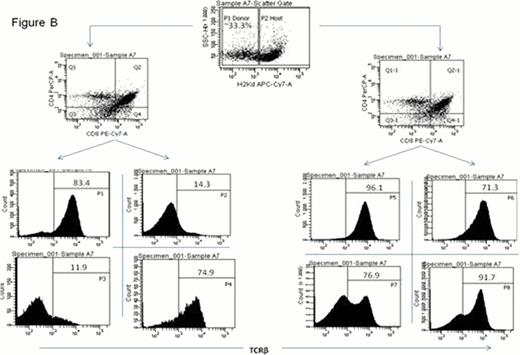Abstract
Abstract 4668
In Utero Hematopoietic Cell Transplantation (IUHCT) is a promising therapeutic strategy for congenital hematopoietic disorders. While mixed allogeneic hematopoietic chimerism with associated donor specific tolerance is routinely achieved by a predominant mechanism of central deletion, the critical events of donor and host thymocyte development have not been analyzed. In this study, we utilized the murine model of allogeneic IUHCT and analyzed donor and host thymocyte development.
Bone marrow (BM) cells (10×106) from Foxp3GFP C57/BL6 (B6, H2kb) mice were injected intravenously into Foxp3GFP Balb/c (H2kd) fetuses at embryonic day 14 (E14). At indicated postnatal time points the thymocytes were analyzed by multi-color flow cytometry.
The results demonstrate that the thymic processing of donor BM-derived thymocytes differs significantly from host thymocytes and from thymocyte development in normal B6 and Balb/c control mice. Though each subpopulation of the host's thymocytes showed comparable levels to the normal untransplanted Balb/c mice, the donor BM-derived thymocytes demonstrated significantly higher proportions of CD4+CD8- and CD4-CD8+ single positive cells, and a dramatically lower proportion of CD4+CD8+ double positive cells compared to their donor-derived counterparts, respectively. These discrepancies increased with each analysis time point up to 12 weeks. Immature single positive cells, including both TCRb-CD4+CD8- and TCRb-CD4-CD8+ cells, were significantly higher in the donor-derived thymocytes than the host, indicating the development of the donor BM-derived thymocytes were impeded at the DN-DP stage in this specific allogeneic IUHCT setting. In addition, we also found higher frequencies and more potent suppressive capacity of regulatory T cells in the donor-derived T cell compartment than in the host T cell compartment. In the reversed allogeneic strain combination, i.e. IUHCT of Foxp3GFP Balb/c BM MNCs into the E14 Foxp3GFP B6 recipients, thymocytes of both origins showed imbalanced intra-thymic development that differed from the normal mouse.
Our data in the current study suggests that immune reconstitution of the donor bone marrow derived thymocytes differs from that of the host cells and that of normal mice in an allogeneic IUHCT system. The mechanism of the altered thymic development in allogeneic IUHCT, and the potential importance of these observations for clinical IUHCT remains to be determined.
Differential Thymic T Cell Development in the Foxp3GFP B6¡úfoxp3GFP Balb/c allogeneic IUHCT.
Differential Thymic T Cell Development in the Foxp3GFP B6¡úfoxp3GFP Balb/c allogeneic IUHCT.
TCR¦Â expression in donor-derived thymocytes are significantly lower than their host-derived counterparts, especially in CD4+CD8+ double positive cells.
TCR¦Â expression in donor-derived thymocytes are significantly lower than their host-derived counterparts, especially in CD4+CD8+ double positive cells.
Bone marrow (BM) cells (10×106) from Foxp3GFP C57/BL6 (B6, H2kb) mice were injected intravenously into Foxp3GFP Balb/c (H2kd) fetuses at embryonic day 14 (E14). At indicated postnatal time points the thymocytes were analyzed by multicolor flow cytometry (Fig. A), and the expression of TCR¦Â in each individual subpopulation in 4-week old mice was measured (Fig. B).
No relevant conflicts of interest to declare.
Author notes
Asterisk with author names denotes non-ASH members.



This feature is available to Subscribers Only
Sign In or Create an Account Close Modal